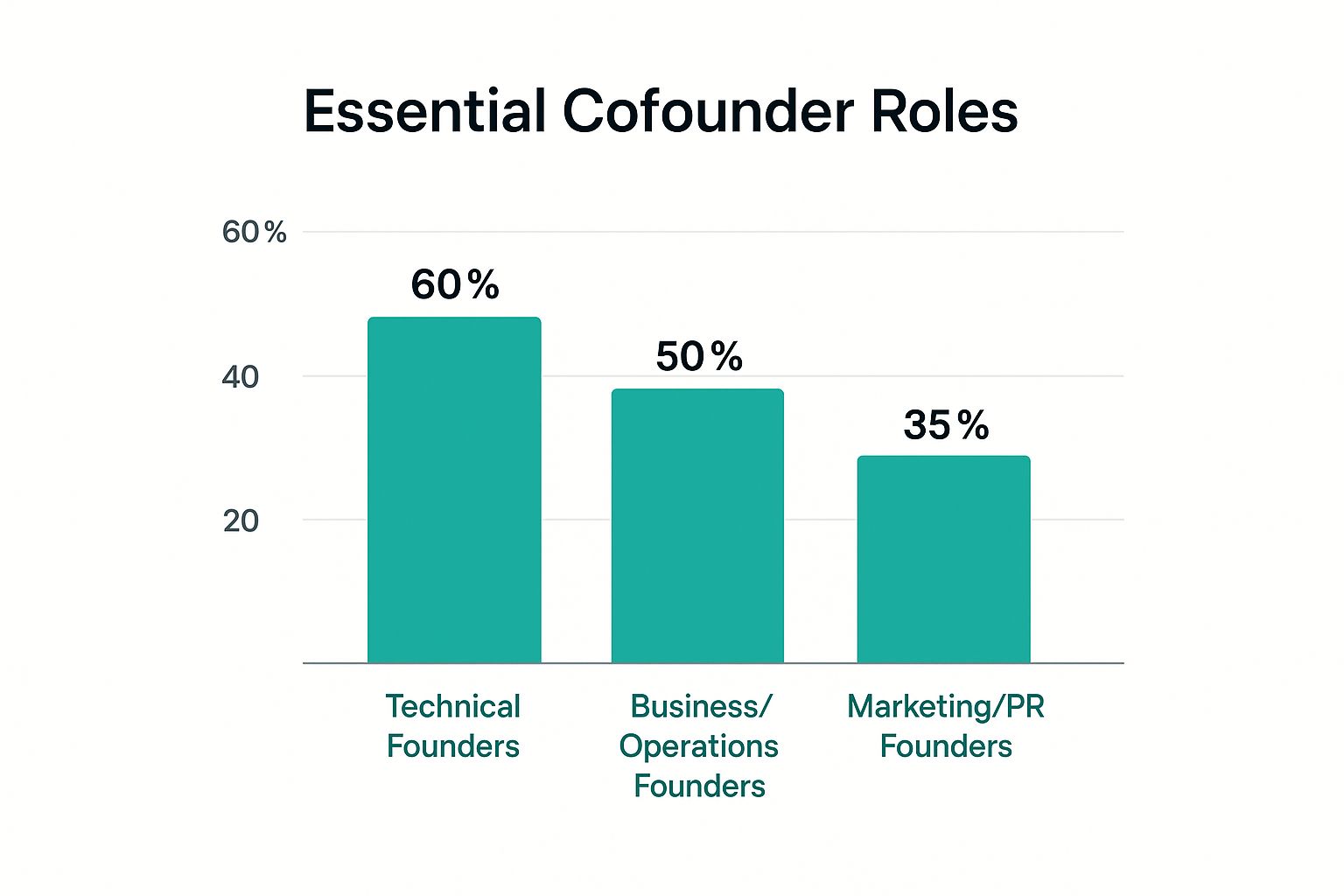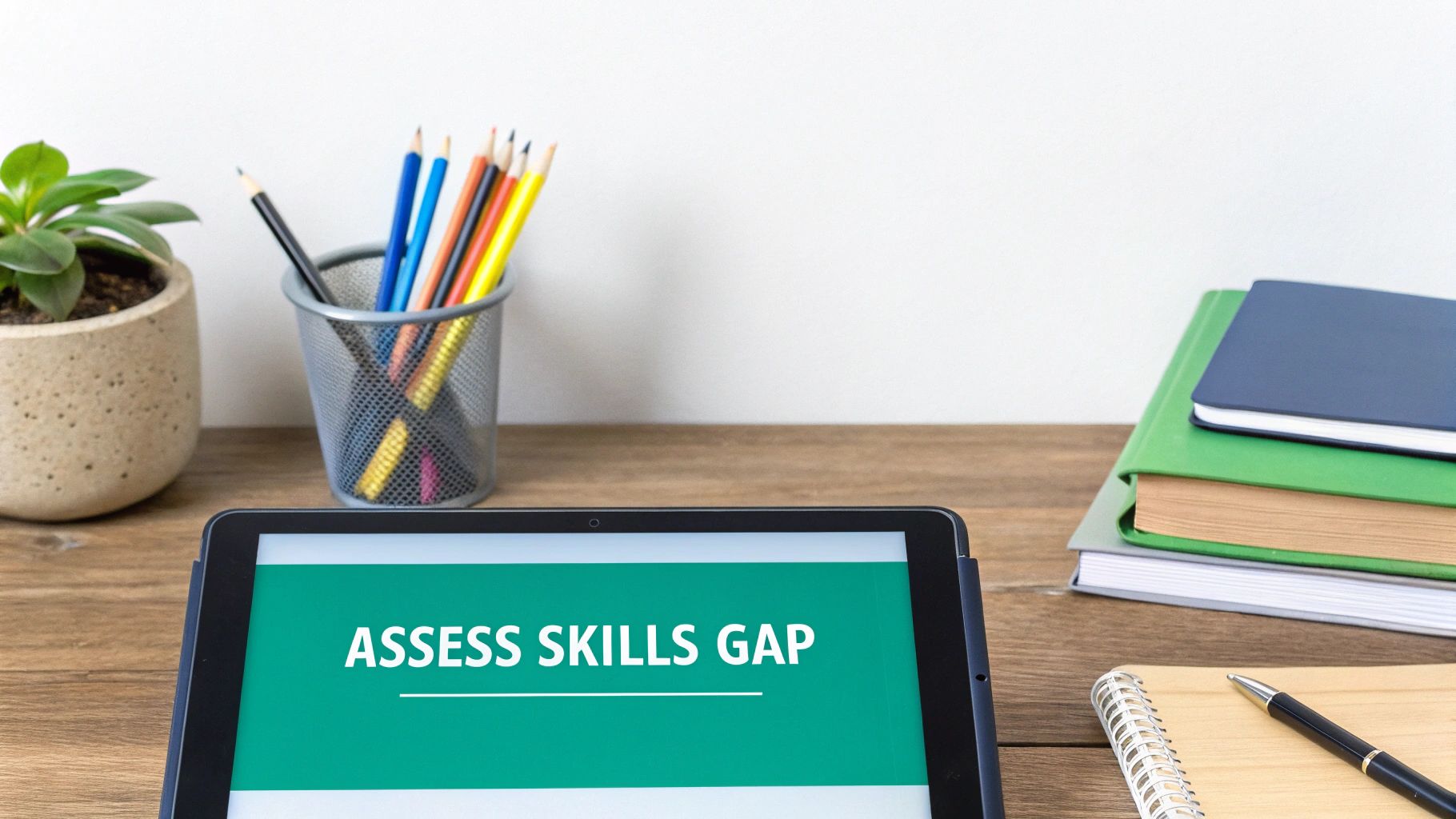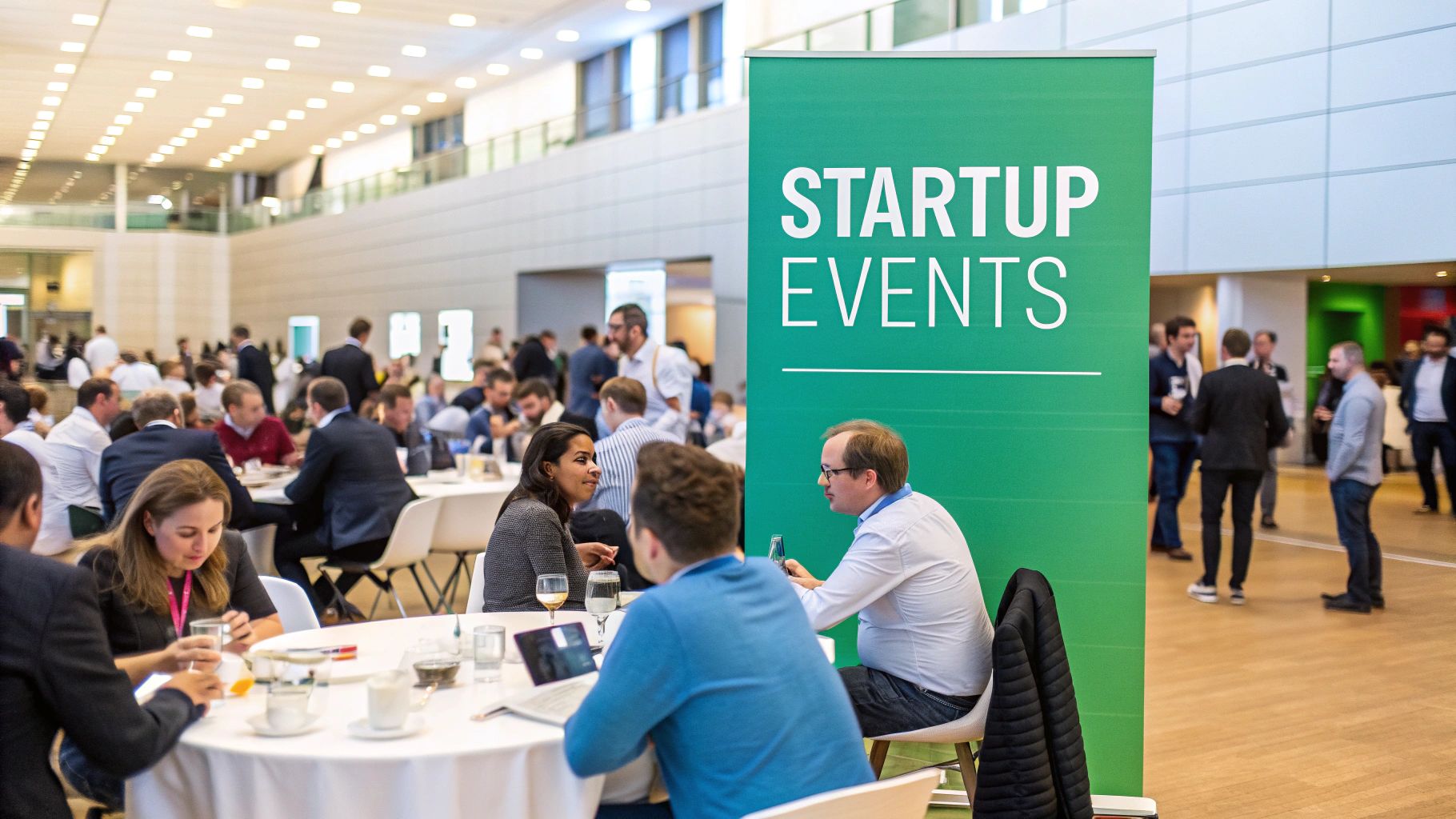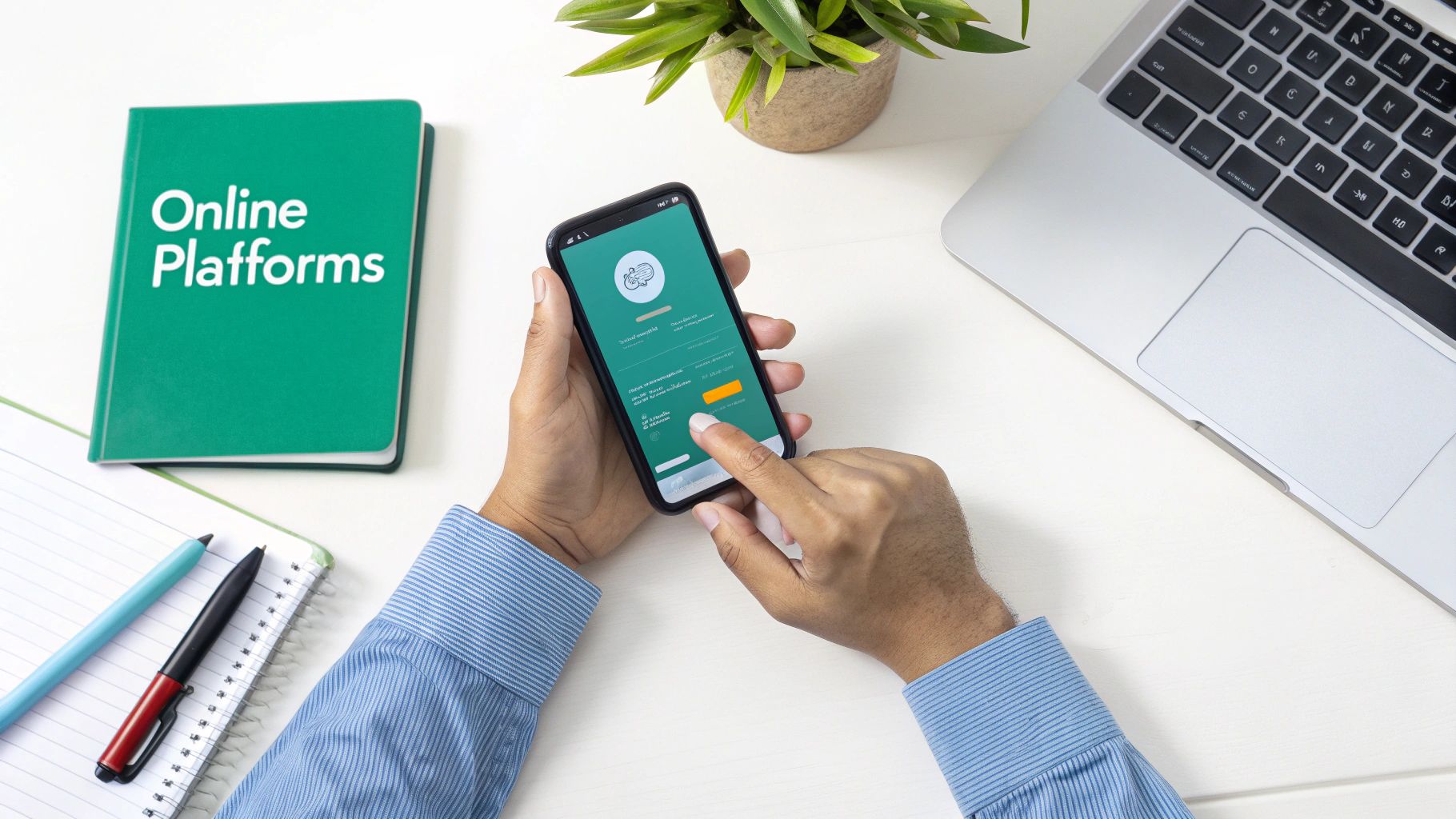Why Your Cofounder Choice Makes or Breaks Everything
Finding the right cofounder is like finding a rare gem. It’s not just about sharing the workload; it’s about shared passion, complementary skills, and that rock-solid support that gets you through the tough times. This isn’t about finding someone to just code or handle the finances. It’s about finding someone you can truly build a lasting business with. And equally crucial? Choosing the right number of cofounders.
Finding cofounders is essential, and historically, the number has greatly impacted a startup’s success. While there's no magic number, research suggests two to three cofounders improves the odds. A study referenced by Professor Ed Roberts at MIT suggests success rates go up with more cofounders, although more than three can become tricky, especially for software startups. This is supported by analysis finding the average number of founders in successful startups is about 2.09. Aiming for two to three can be a real advantage for brainstorming and sharing the work. Learn more about the optimal number of cofounders. Once you've found your cofounder, formalizing your plan is key. Here’s a guide on how to write a business plan.
 This infographic visualizes the distribution of essential cofounder roles, highlighting the demand for Technical, Business/Operations, and Marketing/PR expertise.
This infographic visualizes the distribution of essential cofounder roles, highlighting the demand for Technical, Business/Operations, and Marketing/PR expertise.
As the infographic shows, while technical founders are in high demand (60%), having someone who can handle the business and operations side (50%) is almost as important. Marketing and PR expertise (35%) also plays a big role, showing the value of a well-rounded team. But simply filling these roles with anyone won’t do. You need to consider how these individuals will work together.
Finding the Right Mix
Finding a cofounder isn't just about checking off skills on a list. It’s about that dynamic synergy – where individual strengths not only complement each other but boost the overall impact. A technically brilliant cofounder who's not great at communicating can be balanced by a business-minded partner with strong people skills.
This is why digging deep into personality, work style, and shared values is crucial. Are you both comfortable with risk? How do you handle disagreements? What drives you?
Let's take a look at how team size can influence success. The following table illustrates some key trends:
Startup Success Rates by Team Size
Comparison of success rates and failure patterns based on the number of cofounders
| Team Size |
Success Rate |
Common Advantages |
Potential Challenges |
| Solo Founder |
Lower |
Full control, faster decisions |
Overwhelm, limited perspective, funding challenges |
| Two Cofounders |
Higher |
Shared workload, diverse skills, increased funding potential |
Potential disagreements, slower decisions if not aligned |
| Three Cofounders |
Higher |
Broader skillset, wider network, more resources |
Coordination complexity, potential for conflict |
| Four+ Cofounders |
Lower |
Extensive resources, varied expertise |
Difficulty in decision-making, dilution of equity, communication overhead |
As you can see, while having more founders can bring more resources to the table, it also increases the complexity of managing the team. Finding the right balance is essential for navigating the challenges of startup life. Two to three cofounders often provides the sweet spot between diverse skills and manageable team dynamics.
Mapping Your Perfect Cofounder Beyond Just Skills

So, you're on the hunt for a cofounder. Many founders get laser-focused on finding someone with the “right” skills – the coder, the marketing guru, the finance wizard. But I've learned the hard way that focusing only on skills can be a recipe for disaster. I once partnered with a technically brilliant programmer who, on paper, was exactly what my business background needed. The problem? His communication skills were practically non-existent. We clashed constantly, and it really held us back.
That experience taught me a valuable lesson: finding a cofounder is so much more than just ticking off skill boxes. It's about partnership chemistry. It's about finding someone whose personality, work style, and even how they handle stress, meshes well with yours. Building a solid cofounder profile that digs deeper than just “technical” versus “business” is crucial.
Beyond Technical vs. Business: Defining Complementary Traits
Think of building a team like assembling a puzzle. You don’t need just any piece; you need the right piece that interlocks perfectly with the others. If you’re highly analytical and detail-oriented, partnering with someone equally meticulous could lead to endless overthinking and stalled progress. Someone with a more big-picture, intuitive approach might be the perfect counterbalance. You might find IndieMerger's guide on how to find a cofounder helpful.
Here’s how to start mapping out your ideal cofounder:
- Identify your strengths and weaknesses: Real honesty is key here. Where do you shine, and where do you need support? This helps pinpoint the complementary skills you actually need, not just the ones that sound good.
- Consider work styles and communication preferences: Are you a heads-down, get-it-done type, or do you thrive in a collaborative, brainstorming environment? Do you prefer direct communication, or a more subtle approach? Finding a cofounder whose style complements yours, rather than clashes with it, is essential.
- Think about values and long-term vision: Sharing a similar vision for the company's future is non-negotiable. Do your values align on things like work ethic, company culture, and social impact? These fundamental elements are critical for long-term success.
From Wish List to Reality: Practical Exercises
It’s tempting to create a cofounder wish list filled with impressive-sounding qualities. But you’re searching for a partner, not a superhero. A helpful exercise is to categorize your cofounder criteria: Must-Haves, Nice-to-Haves, and Dealbreakers. This helps prioritize what truly matters and avoid getting sidetracked by appealing but ultimately less important traits. For example, industry connections might be a “Nice-to-Have,” but shared core values and a strong work ethic are definite “Must-Haves.” This focused approach streamlines your search and highlights potential red flags early on.
To help you with this process, I’ve put together a framework you can use:
Essential Cofounder Qualities Assessment Matrix
Framework for evaluating potential cofounders across multiple dimensions including skills, personality, and commitment
| Quality Category |
Must-Have |
Nice-to-Have |
Red Flags |
Assessment Method |
| Skills & Experience |
Proven ability to execute in their area of expertise |
Existing industry connections |
Overstated abilities, lack of verifiable experience |
Portfolio review, technical tests, reference checks |
| Work Style & Communication |
Proactive communication, clear and concise style |
Comfortable with remote collaboration tools |
Inconsistent communication, difficulty receiving feedback |
Trial project, informal meetings |
| Personality & Values |
High integrity, strong work ethic, resilience |
Shared passion for the industry |
Lack of self-awareness, inflexibility |
Personality assessments, values-based interviews |
| Commitment & Vision |
Long-term commitment to the venture, aligned vision |
Experience with startups |
Unrealistic expectations, unclear commitment level |
Open-ended discussions about future goals and challenges |
| Financial Stability |
Ability to manage personal finances responsibly |
Existing personal investment in the venture |
Unwillingness to discuss financial matters openly |
Discussion about personal financial planning and risk tolerance |
This matrix helps you organize your thoughts and create a more structured approach to evaluating potential cofounders. By clearly defining your “must-haves,” “nice-to-haves,” and “red flags,” you can make more informed decisions and increase your chances of finding a partner who is truly the right fit. Remember, finding the right cofounder is a process, not a race. Take your time, be thorough, and trust your instincts.
Where Successful Cofounders Actually Meet Each Other
Forget the stuffy networking events and those awkward, generic LinkedIn messages. Let's talk honestly about where real, lasting cofounder partnerships actually begin. It's often not where you'd think. After years of seeing how successful teams have formed, I've noticed some interesting, and sometimes surprising, trends. Turns out, the strongest cofounder relationships often blossom in the most unexpected of places.
Beyond the Usual Suspects: Unconventional Meeting Grounds
While platforms like IndieMerger are specifically designed to connect founders (and their blog post on finding a cofounder is worth a read), many thriving partnerships form organically within existing communities. Think niche industry meetups, weekend hackathons, or even online forums dedicated to a particular technology or shared interest. These spaces offer a huge, often overlooked advantage: inherent shared passion. You're already connecting with people who are excited about the same things you are.
This shared interest immediately breaks the ice. You're not forcing a connection; you’re bonding over a mutual challenge or geeking out about the latest tech. I vividly recall meeting one of my early collaborators at a local maker space. We were both elbow-deep in similar hardware projects, constantly bouncing ideas off each other. That shared interest evolved organically into a business partnership. It’s this kind of natural connection that often leads to the strongest, most enduring collaborations.
Tapping Into Your Network (Without Being Annoying)
Your existing network is another powerful, and often underutilized, resource. The secret is to approach it strategically. Don’t just blast a generic “looking for a cofounder” message to everyone you know. That's a surefire way to turn people off. Instead, genuinely engage in conversations. Share your thoughts and ideas, ask insightful questions, and genuinely listen to what others are working on. You’ll be surprised how often these conversations uncover shared interests and potential synergies you never even considered.
This approach avoids the “desperate founder” vibe that can be a real turn-off. You're building authentic connections, not just hunting for a business partner. When the time feels right, and you sense a real connection, then you can explore the possibility of a partnership. It's all about building trust first and pitching second.
IndieMerger's focus on verified profiles and in-depth founder information highlights the importance of quality over quantity. It's not about finding any cofounder; it's about finding the right cofounder.
The Art of the "Soft Approach": Engaging Employed Professionals
Keep in mind that many amazing potential cofounders are already happily employed. Approaching them requires a delicate, thoughtful approach. Avoid coming across as desperate or like you’re trying to poach them from their current role. Instead, focus on building a genuine relationship. Express sincere interest in their work, share your own projects and passions, and look for common ground.
This “soft approach” lets you gauge their interest and explore potential synergies without any pressure. It’s about planting a seed, not demanding an immediate answer. Sometimes, these seemingly casual connections bloom into the most rewarding partnerships. Building trust and demonstrating genuine respect for their current situation is key. By sharing a compelling vision and demonstrating your own commitment, you can inspire them to consider joining you on your journey. This approach requires patience, but it's often the most effective way to attract experienced, high-quality cofounders.
Having The Cofounder Conversation Without Scaring Anyone Away

This is where so many potential partnerships go sideways. Those first few chats where you're trying to figure out if you're on the same page, but also trying not to come off as, you know, intense. It's a tricky balance, but absolutely key to finding a cofounder that's truly a good fit. It means talking about the tough stuff upfront, and doing it in a way that builds trust, not walls.
Navigating the Tricky Terrain of Early Discussions
Think of these early conversations as building the foundation of your company. If the foundation's cracked, the whole thing is going to be shaky. You need to be upfront about the big things: how you'll split the equity, who's doing what, what your personal goals are, even your long-term exit strategies. Not exactly light dinner conversation, I know, but essential.
I've seen it happen too many times – founders avoid these discussions, hoping things will just magically work out. Spoiler alert: they don’t. Those unspoken expectations become silent resentments and eventually blow up into major conflicts. Much better to get it all out in the open early on, even if it feels a little awkward.
Real Talk: Conversation Frameworks That Work
So, how do you have these conversations? Here's a framework I've used myself, and I've seen work well for other founders:
Start with the “Why”: Share your vision. Why this company? Why are you so passionate about it? This helps you find common ground and creates a shared sense of purpose.
Define Roles and Responsibilities: Who's bringing what to the table? This doesn't need to be set in stone, but a general understanding of who’s doing what is key.
Discuss Equity: This is often the most sensitive topic. Be transparent about how you're thinking about the split, and be willing to negotiate. Think about factors like time commitment, financial contributions, and unique skills.
Talk Long-Term Goals: Where do you see yourselves in five, ten years? Making sure your long-term goals align is crucial for the future of the company.
Recognizing Red Flags: When to Walk Away (Politely)
Sometimes, even if someone looks great on paper, something just feels…off. Maybe they're vague about their commitment, or they dodge questions about their past experiences. Perhaps their values don’t align with yours, or their communication style just rubs you the wrong way.
Trust your gut. If something feels wrong, it probably is. It's okay to politely step back, even if you’re desperate to find a cofounder. A bad cofounder can be worse than no cofounder at all. Remember, finding the right partner is a marathon, not a sprint. It’s about building a relationship that can handle the ups and downs of startup life.
Testing Partnership Chemistry Before You Commit

Finding the perfect cofounder isn't just about ticking off boxes on a skills checklist. It's about finding someone you can genuinely work with, someone who's in sync with your work ethic and can weather the inevitable storms of startup life. A charming personality over coffee doesn't necessarily translate to a compatible business partner. This stage is all about figuring out if you're truly compatible on a practical level.
Trial by Fire (Project): Unveiling True Working Styles
One of the best ways to see if you and a potential cofounder click is through a small, collaborative trial project. This could be anything from building a basic prototype or a marketing campaign to tackling a research task together. This hands-on experience gives you real-world insights into how they operate. Are they organized or a bit scattered? Do they communicate proactively, or do you find yourself constantly following up?
For example, imagine you're building a SaaS product. A great trial project could be designing and building a simple landing page together. This lets you observe their problem-solving approach, how they handle deadlines, and how they navigate disagreements. It's a low-stakes way to experience actual collaboration before any formal commitments.
Collaborative Exercises: Spotting Decision-Making Patterns
Beyond practical projects, structured collaborative exercises can be incredibly insightful. Imagine a brainstorming session where you outline potential business challenges and discuss solutions. This shines a light on their strategic thinking, how they react to different ideas, and their decision-making process. Are they good listeners who consider different perspectives, or do they tend to push their own ideas regardless?
These exercises don't need to be complex. Even a simple SWOT analysis can reveal key differences in how you approach problems, assess opportunities, and evaluate risks. This information is gold when considering a long-term partnership.
Gradual Engagement: The Slow Burn Approach
Jumping headfirst into a cofounder relationship can be a recipe for disaster. A gradual engagement strategy is much wiser. Start with informal collaborations, slowly increasing the level of commitment and responsibility as trust grows. Think of it like dating—you wouldn't propose on the first date!
This approach allows you both to evaluate the partnership without pressure. You can see how you work together in different situations, how you handle conflict, and, importantly, if you actually enjoy each other's company. It’s a much more organic way to move from "potential cofounder" to true business partner.
Warning Signs and Graceful Exits
Knowing when to walk away is vital, even if it feels awkward. Are they consistently missing deadlines? Is there a disconnect between their words and actions? Are they unwilling to compromise or value your input? These are red flags you shouldn't ignore. It's important to remember that finding a cofounder can be tough, and many partnerships don’t work out. In fact, up to 90% of startups fail, many within the first few years. Research even suggests solo founders have a higher chance of being in the top 10% of successful startups. Discover more insights about startup failure rates.
If you decide a partnership isn't right, handle it with grace. Be honest and respectful, and avoid burning bridges. Explain your reasoning clearly and professionally, focusing on the mismatch in working styles or vision, not on assigning blame. This protects your reputation and keeps the door open for future collaborations in different capacities. A respectful approach can transform a potentially uncomfortable situation into a valuable learning experience. Remember, even if this partnership doesn’t pan out, it doesn't mean you've failed. It means you've learned something important about what you need in a cofounder.
Making Your Partnership Official Without The Legal Drama
So, you’ve found your perfect co-founder. You've battled through the initial hurdles, tested your compatibility, and you're both buzzing with excitement to build something amazing. Awesome! Now comes a really important step—one that separates the partnerships that thrive from those that, well, explode: making it official.
This isn't just about signing on the dotted line. It's about building a solid foundation for a strong, lasting working relationship. Think of it like laying the groundwork for a house – you want to make sure it can weather any storm.
The Founder Agreement: Your Partnership's Constitution
I like to think of the founder agreement as the constitution of your partnership. It’s the document that lays out all the ground rules, ensuring everyone is on the same page and, importantly, protected.
This agreement covers the essentials: how you’ll split the equity, each founder’s roles and responsibilities, how you’ll make decisions (especially the tough ones!), and who owns the intellectual property. It also tackles the less fun stuff, like what happens if someone leaves the company or if you hit a major disagreement.
A solid founder agreement isn’t about mistrust; it’s about clarity and protection. It's the bedrock upon which trust can actually grow.
Getting this documented might feel like a chore, but take it from me, it's 100% worth it. It's an investment in the long-term health of your company and your sanity. For some great practical advice and examples, check out IndieMerger's guide on co-founder equity splits. It really helped me when I was navigating this with my own co-founder.
Structuring Equity: Finding the Right Balance
Figuring out equity splits is a balancing act. You want to recognize each founder’s contribution and create a structure that keeps everyone motivated, now and in the future. It's not just about who's doing what today, but also about future contributions and each founder’s long-term commitment.
A dynamic equity split, where percentages can shift based on hitting milestones or individual performance, can be a really smart move. It allows for adjustments down the line, which can be really helpful as things evolve.
When I was starting out, we found it helpful to explore different models of relationship dynamics. Understanding potential co-founder compatibility really involves considering individual working styles and how those styles might interact. These resources can offer helpful insights into how different personality types might collaborate, helping you anticipate potential bumps in the road.
Decision-Making Power: Avoiding Gridlock
Clearly defined decision-making authority is crucial, especially as your company starts to grow. Who gets the final say on big decisions? Is it shared, or is there a designated "tie-breaker"? Having this clarity upfront helps avoid gridlock and keeps things moving efficiently.
Vesting Schedules: Protecting Your Investment
Vesting schedules are like a safety net for your equity. They ensure that founders earn their shares over time, usually over several years. This protects the company if someone decides to leave early on, and it encourages long-term commitment from everyone involved. Think of it as an incentive to stay invested in the company's success for the long haul.
Beyond the Legal: Open Communication and Shared Values
While the legal side of things is essential, it's really just one piece of the puzzle. A truly strong partnership relies on open communication, shared values, and genuine respect.
Regularly checking in with each other, honestly addressing concerns, and maintaining transparency are vital. This builds trust and prevents those little misunderstandings from snowballing into major conflicts. A rock-solid legal agreement can protect you from legal drama, but a healthy, communicative partnership is your best defense against unnecessary conflict overall.
Your Complete Cofounder Search Action Plan
So, you’re thinking about finding a cofounder. That’s a big decision, and finding the right person can make or break your startup. This isn't just about filling a skills gap; it’s about building a lasting partnership. This is your roadmap from that initial "I need a cofounder" thought to actually building something incredible, together.
Building Your Personalized Cofounder Roadmap
First things first: search criteria. Don’t just focus on hard skills. Really think about personality, work styles, and shared values. Where are your strengths and weaknesses? Where do you shine, and where could you use some serious backup? This will help you identify the ideal partner who complements your own abilities.
Finding the perfect cofounder takes time. Be patient and break down the process into manageable chunks. Maybe dedicate a few hours a week to networking on platforms like LinkedIn or researching potential candidates. This prevents you from feeling overwhelmed and lets you track your progress.
Managing Multiple Potential Partnerships
Talking to several potential cofounders at once? That’s completely normal, even advisable. Just be upfront about it. Transparency is key. It’s like dating—you wouldn’t commit to a relationship without exploring a few options. This keeps everything ethical and prevents misunderstandings down the line.
Once you’ve found someone promising, set up clear communication channels. Regular video calls, shared project management tools like Asana or Trello, or even co-working spaces can help. Consistent communication builds rapport and keeps everyone on the same page. Speaking of the legal side, if you're in NYC, this resource on starting a business in NYC is invaluable.
From First Contact to Commitment: A Step-by-Step Guide
Start with low-pressure interactions. A quick coffee chat or a short online exchange is a great way to get a feel for someone without a huge time commitment. If there's a spark, suggest a small trial project. Working together, even on something small, will reveal how you actually collaborate and if your work styles mesh.
If that goes well, gradually increase the level of engagement. This could involve more complex projects, deeper conversations about long-term goals, and eventually, if everything aligns, formalizing the partnership with a founder agreement.
What If It Doesn't Work Out?
Not every cofounder search has a happy ending. Sometimes, despite your best efforts, things just don’t click. If you realize a partnership isn't working, address it quickly and professionally. Honesty and respect are crucial. Focus on the mismatch, not on placing blame. A smooth exit preserves relationships and protects your reputation.
Finding a cofounder is a journey. It requires time, effort, and a solid understanding of yourself and what you're looking for. But trust me, when you find the right partner, it changes everything. Ready to start your search? IndieMerger connects verified founders with complementary skills, streamlining the entire process. Visit IndieMerger today and start building your dream team.